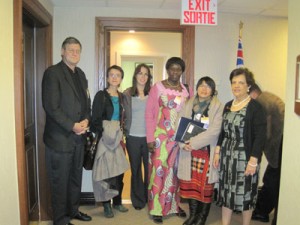Living Women’s Courage vs extractive industries and for rights
Living Women’s Courage vs extractive industries and for rights
By Vernie Yocogan-Diano

At Canada’s Parliament Hill with Sen. Mobina Jaffers, Chair of the Canada’s Senate Committee on Human Rights with the Living Courage Tour members: Vernie Yocogan-Diano (2nd from left), Chantal Binlulu (3rd from left) with staff of Kairos.
ON THE LAUNCHING of the Canadian Tourism and Hospitality Center on 6 November 2011, Canadian Ambassador Christopher Thornlay told reporters that Canadian mining companies are staying in the Philippines and mining companies have been satisfied of government action.
On the same report, Julian Payne, the President of Canadian Chamber of Commerce of the Philippines said that laws should have equal application to both small-scale and large-scale mining operators.
The statements of the Ambassador and the President of the Canadian Chamber of Commerce of the Philippines are a perfect reflection of the 1% powerful in Canada.
Such statements are complete ignorance of local communities’ voices and stance against large-mining and regulated people-based small-scale mining. It is a contradiction of Canada being an acknowledged world leader on human rights. It must earn outrage from Canada’s 99% raging against the global economic crisis.
Sections of the 99% of the Canadian community that we met in the Living of Courage Tour of women human rights defenders from the Global South with First Nation and migrant women in Canada are in full support that Canadian government and mining corporations must pull out when affected communities say so. Kairos, an ecumenical organization in Canada that works on social justice issues with partners in Global South countries including the Philippines, Congo and Sudan organized the Living Courage Tour of women human defenders across Canada from 11-28 October 2011. It served to share to the Canadian community the perils of mining to women and their communities, the sacrifice of human rights and the continued impunity of governments to human rights issues and violations related to extractive industries and national security, peace and development programs.
Rebecca Nyagai Yol Kafi from the Sudan Council of Churches was unable to join the Tour. She was made to wait for her visa in Cairo, Egypt for three weeks. Uncertain if her visa will be released, Rebecca decided to return home in Sudan. Without Rebecca, the Tour proceeded with Chantal Binlulu of Heirs of Justice, a community-based program in Congo that provides ‘strength to the weak’ especially women who are victims of state violence, and Vernie Yocogan-Diano of Innabuyog, an alliance of indigenous women’s organizations in the Cordillera region, Philippines. First Nation and migrant women of courage joined Chantal and Vernie in the panels in almost all public events from British Colombia, Saskachewan, Manitoba, Ottawa to Montreal. Canadian communities that came in the public events were from churches, local human rights and justice organizations, women’s groups, First Nations, migrant organizations of Filipinos, Congolese, Sudanese and others from Africa and Latin Americas, academics and students, researchers and groups of diverse advocacies.
Meetings with some officials and institutions were done in Ottawa, the seat of political power in Canada. The Living Courage team met with the Chair of the Senate’s Committee on Human Rights, Mobina Jaffer. She expressed concern about the persistence of Canadian mining corporations in the Philippines and elsewhere in the world even if affected peoples are opposing. She also expressed interest in joining the Human Rights-Mining Tour in the Cordillera in early January 2012. She shared about her report on ‘A Day on the (Parliament)Hill: A Day of Action for Canadian-Congolese Women’ which was presented on July 2009. The report that was brought to the Senate spoke of the use of rape to Congolese women “as a weapon of war on a scale the world has never seen before”. The strife is fuelled by on-going mining interests of which Canada is involved. The report urged Canadian government to be involved in ending the conflict in Congo. Sen. Jaffers arranged with the Senate the appearance and recognition of the Living Courage Tour at the Senate’s session that day. A very short meeting with Members of the Parliament including the author of Bill C-300, MP John McKay, was held. Bill C-300 was rejected by the Parliament in October 2010. The law was meant to make Canadian corporations accountable and responsible in the countries they operate.
Recommendations forwarded by the Living Courage Tour included support to peace-building initiatives of women in all levels and related o the UN Security Council Resolution 1325, accountability and responsibility of governments (Canada and governments of receiving countries of Canadian corporate operations) in relation to extractive industries and ending government impunity.
In this week’s observance of mine un-safety week, indigenous peoples’ and women’s organizations in the Cordillera who have long stood against the irreversible destruction caused by mining to ancestral homelands, the corresponding damage to peoples’ livelihood and community integrity and the violation of people’s rights, occupied the People’s Park in Baguio City to reiterate to the Philippine government, governments of the Global North who are the prime investors to mining and their corporations that indigenous peoples in the Cordillera continue to resist mining projects. Indigenous peoples’ organizations led by the Cordillera Peoples Alliance (CPA) also called for the passage for the People’s Mining Act that is being pushed in Philippine Congress by progressive legislators led by the peoples’ partylist Bayan Muna.
———————————–
(Vernie Yocogan-Diano, Cordillera Women’s Education Action Research Center,11 November 2011)



Comments (0)